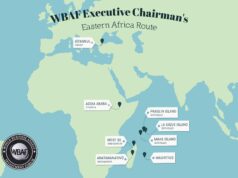ENTREPRENEURSHIP IN NORTH AFRICA
 A frank, powerful canvassing of the reality of being a North African woman entrepreneur; plus some poignant remedial solutions.
A frank, powerful canvassing of the reality of being a North African woman entrepreneur; plus some poignant remedial solutions.
DOUJA GHARBI
President, Entrepreneurship Center and Endogenous Development
Women represent a considerable pool of untapped potential for North African economies. Whilst comprising over 50% of the population and some 47% of the education enrollment figures, women make up only 24% of the labor force – the lowest for any region in the world.
In addition to that, the number of women entrepreneurs in the region is very low; and those that do exist mostly lead micro-enterprises, have undertakings in the informal sector, or contribute toward traditional sectors like agriculture, handicraft, and textile industries.
Considering the high unemployment rate in many North African countries, only one in three youths are economically active. Notwithstanding, only one young woman in five is economically active, and young women are two to three times more likely to be unemployed than young men. Among this dark picture, entrepreneurship shines as a bright, beaming light; promising to be a key driver of economic growth and enhanced competitiveness. It follows then that women’s increased participation in entrepreneurial activity is a prospective source of advancement, with the growth in numbers of women entrepreneurs being a long overdue solution.
However, women’s entrepreneurship in North Africa is faced with a deep absence of an entrepreneurial culture, and strong social social barriers to overcome where women are traditionally expected to play the role of mother and housewife – even if they are educated graduates. At the same time, those women that are able to overcome these barriers to entry are also facing many other challenges; such as a lack of access to information, a non-supply of training and skills development, limited access to market, little access to opportunities and networking, and a vast chasm between idea generation and access to finance.
Further complicating the matter is the fact that – due to cultural conditioning – North African women are often relatively lacking in relevant soft skills, such as selfconfidence and leadership; and they frequently demonstrate an inculcated perception that they are not capable of starting their own businesses, that they are afraid of failure, and that they are highly risk-averse – even if entrepreneurship is seen as a good career choice.
Several studies have shown that North Africa’s few existing women entrepreneurs have a significant positive impact on their local ecosystem and on the economy, as they tend to be creative, demonstrate natural innovativeness, are more likely to employ women, are perceived as good-natured managers, and are more likely to pay back loans. Taking this into consideration, empowering women entrepreneurs – and constructing spaces that can be cohabited by women, innovation, and capital – will lay the foundations for powerful, inclusive changes and sustainable economic growth.
Encouragingly, there are several recommendations that have been drafted and proposed to governments in North African countries, which have pledged their commitments to gender equality through their constitutions. It is therefore pertinent to highlight the proposals that are poised as the most important, quick-win solutions.
Governments must adopt women targeted policy as well as effective women entrepreneurship strategies. A fine example is the case of Tunisia, where the Ministry of Women Affairs – with the support of international institutions such as the EU, ILO, UNDP and UNIDO – set up a national strategy for women’s entrepreneurship in 2016. Thereafter, they immediately began implementing effective activities at a macro, meso, and micro level, supporting different actors of the entrepreneurial ecosystem in order to make the business environment more friendly to women entrepreneurs. They also went about supporting the women themselves by providing training, coaching, and other non-financial services aiming to empower women entrepreneurs. Finally they implemented a credit line dedicated exclusively to women entrepreneurs.
“Empowering women
entrepreneurs will lay the
foundations for powerful,
inclusive changes and sustainable
economic growth.”
Access to finance is likely the most challenging barrier to women’s entrepreneurship, and is regarded as the number one reason for women moving towards the informal sector. It must be stressed here that traditional banks have demonstrated their limits when it comes to financing developing economies; and that, as a result, the need to see the emergence of new and adapted financial products in North African countries is as marked as ever. Whilst there is ample activity in the alternative finance space, these offerings need to be properly promoted, and adapted regulations have to be implemented to cater for them. This is where venture capital, private equity, Angel Investors, and crowdfunding platforms come in.
Improving access to nonfinancial services is also among the recommendations that should be acted upon quickly. Several studies have concluded that women are more likely to ask for support and advice from family and friends. This is indicative of the importance of access to skills training, coaching, mentoring, counseling, and networking; and should be considered a top priority in invigorating women entrepreneurship. Furthermore, whilst awareness of formalised Business Development Services (BDS) is not prevalent among women in North Africa, there are a number of women associations and public institutions trying to provide BDS. However, to be effective, these organisations need to be centrally coordinated and empowered, so as to not overlap or detract from one another. Mentoring and networking programs should also be promoted, as they present strong opportunities for women to share information, to learn from each other, and to secure mutual beneficial business arrangements. Successful networking and promotion thereof also has a big role to play in reducing the fear of failure, building self-confidence, and opening minds to new opportunities.
Beyond skills and finance, access to market is also an area where women need effective practical support. Women-led businesses need to get more information about markets; they need to be assisted to develop and prepare their products, processes, and enterprises to thrive in new markets and to respond to special demands.
Finally, it is paramount to empowering women – and promoting women’s entrepreneurship – that there exists a nuanced understanding of the significant social and cultural forces in play that compromise women in unignorable ways. Special programs for families and local communities can go toward redressing these forces, and can craft situations in which women entrepreneurs are better supported within these close environments.



























